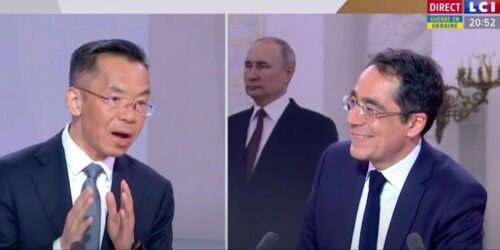The Brazil-China relationship, as seen through the BRICS bank
Elias Jabbour, a prominent Brazilian economist, was hired last month as an aide to New Development Bank president Dilma Rousseff. The appointment of Jabbour, known by some as a "China apologist," stirred up controversy in the Brazilian press, all while current Brazilian president Lula seeks closer diplomatic ties with Beijing.

In March, former Brazilian president Dilma Rousseff was elected to lead the New Development Bank (NDB), established by Brazil, Russia, India, China, and South Africa (BRICS). A few months after her election to the post, Rousseff hired Elias Jabbour, a prominent economist, as a researcher and aide. The hiring prompted immediate controversy in Brazilian media, in large part due to Jabbour’s far-left viewpoints.
While Jabbour’s appointment does not necessarily indicate a shift in Brazil’s China policy, his hiring does raise questions about the future bilateral relationship between the two countries, which have increasing international aspirations. Jabbour is clearly sympathetic to the Chinese Communist Party (CCP) — how might that affect Brazil’s relations with its second-biggest trading partner, the United States? Is his hiring illustrative of Brazil’s increasingly friendly relationship with China?
A lot of the controversy surrounding Jabbour’s hiring initially focused on an interview he did on Inteligência Ltda, a popular Brazilian podcast. “During the entire Bolsonaro administration and last election [in 2022], [Jabbour] shared his opinions against the administration by participating in a lot of podcasts, including some that are very conservative,” Rafael Abrão, a Brazilian researcher with the International Institute for Asian Studies, told The China Project. Former president Jair Bolsonaro of the conservative Liberal Party, who lost to Luiz Inácio Lula da Silva of the left-wing Workers’ Party, was outspoken in his criticism of China, while Lula has said he hopes to work with Beijing.
Abrão says that Jabbour, a member of Brazil’s Communist Party, became a prominent anti-Bolsonaro voice.
In the Inteligência Ltda interview from a year ago, Jabbour seemingly justified the use of capital punishment for opponents of socialism. Multiple Brazilian news outlets ran articles with headlines such as “Dilma’s advisor at BRICS Bank has defended the death penalty for those who oppose socialism.” Right-wing Brazilians also used this clip to paint Jabbour as an extremist and to criticize Rousseff for hiring him.
Defenders of Jabbour, though, have argued that he doesn’t believe any such thing. They argue that Jabbour was referring to the case of Cuba, where, they say, dissidents may be U.S.-funded and pose an existential threat to the state.
Jabbour has made less contested comments that have gotten less media attention. He has criticized a UN report on the subject of genocide in Xinjiang, disregarding the report as a result of Western forces. He previously called Xinjiang the biggest fake news in history. He has also criticized Brazil for being the only BRICS country to vote in favor of the UN resolution calling on Russia to withdraw from Ukraine.
But it is his beliefs on “de-dollarization” and multipolarity that are the most consequential, given his role at the bank, and may be raising some eyebrows among U.S. officials. In April, Jabbour wrote that a movement to transform the dollar into a “weapon of mass destruction” began with the presidency of Barack Obama. He has also praised Lula’s foreign policy in that it moves Brazil “closer to China and the Global South.” In Jabbour’s view, Brazil should strengthen its relationship with China and weaken its relationship with the U.S.
Are Jabbour’s views on these issues illustrative of what Lula also believes?
At a summit of South American presidents that Lula organized in May, the Brazilian president said that it would be a “dream” to have a regional currency “so that we can do business without depending on the dollar because the dollar belongs to the United States and it can do whatever it wants with it.” In April, during a speech given in Shanghai at the BRICS bank, Lula also said, “Every night I ask myself why all countries have to base their trade on the dollar. Why can’t we do trade based on our own currencies?”
Lula’s remarks were welcomed by Xí Jìnpíng 习近平, who also is trying to reduce China’s dependence on the dollar and promote the use of the renminbi in foreign trade and economic exchanges. Furthermore, last month it was reported that Alexander Babakov, the deputy chairman of Russia’s State Duma, is leading efforts to develop a new BRICS currency. The plans for this currency will possibly be announced at the BRICS Summit in South Africa in August.
“This idea of creating a new currency is an idea that has been vocalized by Brazil and China throughout the years,” Abrão told The China Project. “But the difference now, I think, is that China…has become a global superpower. So China has a lot of ways to consolidate a new currency. But it needs allies to do that.”
And according to Abrão, Brazil is China’s perfect ally in this endeavor; key foreign policy goals for Lula are to create a new multipolar world order and to reduce Brazilian dependence on the dollar.
Brazil and China have been forging increasingly robust economic ties in recent years. China is Brazil’s largest trading partner, while Brazil holds the same distinction as China’s largest trading partner in Latin America. In 2020, Brazil’s exports to China accounted for $67.8 billion, representing 52% of the total exports from Latin America and Caribbean countries to China. Despite not formally joining China’s Belt and Road Initiative, Brazil, the largest country in the continent, still attracted over half of all Chinese investments in Latin America as of 2020, according to a study by Luiz Augusto de Castro Neves and Tulio Cariello of the Brazil-China Business Council. During the tenure of the former president, bilateral trade between the two nations experienced substantial growth, increasing from approximately $100 billion in 2019 to $135 billion in 2021.
In light of Brazil’s expanding relationship with China, both Brazilian experts who spoke with The China Project said that Jabbour was the natural choice for this position. They also agreed that Jabbour’s hiring was not intended to antagonize the U.S. or other Western countries.
“Jabbour is one of our greatest researchers,” Kelly Fereira, a professor at the Pontifical Catholic University of Campinas (PUC Campinas), told The China Project. “Yes, he’s far left, but I think the rationality to choose him is more to demonstrate to China that we really care…and that we want to be closer to China, especially after four years of the Bolsonaro government.”
Brazil wouldn’t have hired someone who espouses anti-China viewpoints for a position at a bank based in Shanghai. But as Fereira points out, his hiring demonstrates to China that Brazil is willing to appoint allies to China-based positions.
And given the recent embarrassment China faced after Canadian Bob Pickard made explosive comments while resigning as global communications chief of the Asian Infrastructure Investment Bank (AIIB), China likely also wants to avoid that type of situation again. With Jabbour, China knows Rousseff will be advised by a champion of the CCP.
Jabbour’s role at the bank will be to serve as Rousseff’s adviser and conduct research.
“Dilma can ignore everything that Jabbour [tells her],” Fereira said. “But we must understand that there will be some influence…What she reads influences what she decides, and what she reads will be produced by him.”
Rousseff, a torture survivor, was seemingly willing to raise human rights issues with China while she was president of Brazil. However, these days there is zero indication that she has such qualms about Xi Jinping’s human rights record. On the contrary, she has spoken glowingly about China’s lifting of hundreds of millions out of poverty and has presented Hong Kong as a key to the success of the New Development Bank.
Despite Brazil and China’s attempts to jettison their dependence on the dollar, that may be easier said than done.
Reporting from the Wall Street Journal last month found that the “BRICS’s development bank is fighting for its very survival, threatened by its own reliance on the U.S. currency.” The piece explains that since Russia’s invasion of Ukraine, Wall Street has been hesitant to lend to a bank with 20% Russian ownership, leading the bank to take on expensive debt. The reporters also detail how “two-thirds of the bank’s borrowings” are “dollar-dominated” and that Chinese officials are now trying to distance Xi Jinping from the bank.
The China Project reached out to Dilma Rousseff and the New Development Bank for comment but received no reply. Elias Jabbour was unable to give any on-the-record comments for this article.






